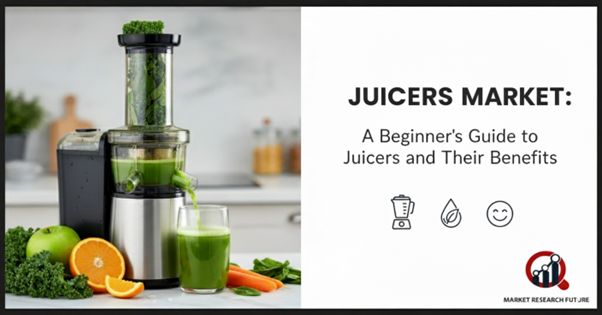An Introduction to Juicers

Juicer Market
One of the most widely used kitchen tools nowadays is a juicer, which is made to easily extract juice from fruits and vegetables. Juicers have become a vital tool for families, wellness enthusiasts, and even cafés that serve fresh, plant-based diets in a world where people are more concerned about nutrition than ever before.
From quick and easy models to slow, nutrient-preserving devices, modern juicers are available in a wide range of styles to meet various needs. There are still some manual options available for individuals who prefer simplicity, even though the majority of juicers are electrically powered. Regardless of the type, the primary objective is always the same: to provide flavorful, fresh juice devoid of pulp, seeds, and undesirable residue.
Online marketplaces and physical appliance stores both sell juicers. They are adaptable enough to be utilized in settings where fresh nutrition is valued, such as homes, restaurants, juice bars, cafés, and even medical facilities.
Juicing Types
Centrifugal Juicers
One of the most popular and reasonably priced options is centrifugal juicers. They shred fruits and vegetables with sharp blades at high speeds, then separate the pulp from the juice. Because of their speed and efficiency, these juicers are perfect for anyone who wants a glass of juice quickly and doesn't want to wait around for it. They frequently produce a slightly foamy juice, though, and can be a little noisy. They are ideal for smaller kitchens and are easy to store due to their small size.
Cold-Press Masticating Juicers
The purpose of masticating juicers, sometimes referred to as slow or cold-press juicers, is to optimize nutrition. They use an auger that slowly crushes and squeezes produce rather than spinning at high speeds. By preserving enzymes, vitamins, and minerals, this process results in juice that has a deeper flavor and lasts longer. They are especially well-liked for juicing hard vegetables, wheatgrass, and leafy greens. Because of their superior juice quality, health enthusiasts prefer them even though they can be more costly and time-consuming.
Juicers with syphons
Compact and straightforward, syphon juicers use filters and pressure to separate juice from solids. They are ideal for small households that require quick servings of juice because they are lightweight and manageable. Despite not extracting as much liquid as cold-press or centrifugal juicers, they are inexpensive, portable, and practical for novices. The drawback is that after every use, they require frequent cleaning.
Commercial Juicers
Commercial juicers are more powerful and long-lasting for large homes, juice bars, and cafés. These devices are designed to process large amounts of produce and frequently combine various juices. Numerous commercial models are improved slow juicers that preserve the nutritional advantages of cold-press extraction while being built for heavy use.
Selecting the Proper Juicer
In 2025, lifestyle will play a bigger role in selecting the best juicer than availability. While consumers who are health-conscious tend to favor slow juicers for optimal nutrition, those with hectic schedules might favor centrifugal juicers due to their speed. Siphon juicers are convenient and space-efficient for casual use or smaller kitchens.
Before making a purchase, you should think about price, durability, cleaning ease, and the kinds of fruits or vegetables you want to juice. Smart features, quieter motors, and sleek designs that complement the aesthetics of contemporary kitchens are also features of many of the more recent models.
Advantages of Juicing
Juicing is now a standard component of healthy living, rather than just a wellness fad. Juices that are freshly made offer a concentrated source of vitamins, minerals, and antioxidants that promote immunity, skin health, and energy. They can greatly improve digestion, general vitality, and weight-management regimens.
Fresh juices provide the body with nourishment and hydration without the needless additions found in sugary drinks or sodas. These days, popular blends include tropical mixes with pineapple or mango, wellness shots with ginger or turmeric, and green juices made with cucumber, spinach, or kale.
Juicing is a lifestyle choice and a health habit that also encourages people to try new plant-based diets and flavors.
Conclusion
From quick morning juicers to slow, nutrient-rich extractors, the 2025 juicer market is booming with innovation, providing something for every need. There is the ideal juicer out there for everyone, whether they are busy professionals, health enthusiasts, or just people who like fresh juice.
Juicing has evolved beyond simply pressing fruits; it now unlocks nutrition, promotes wellness, and allows you to enjoy tasty, fresh drinks at home or on the go.

Leave a Comment